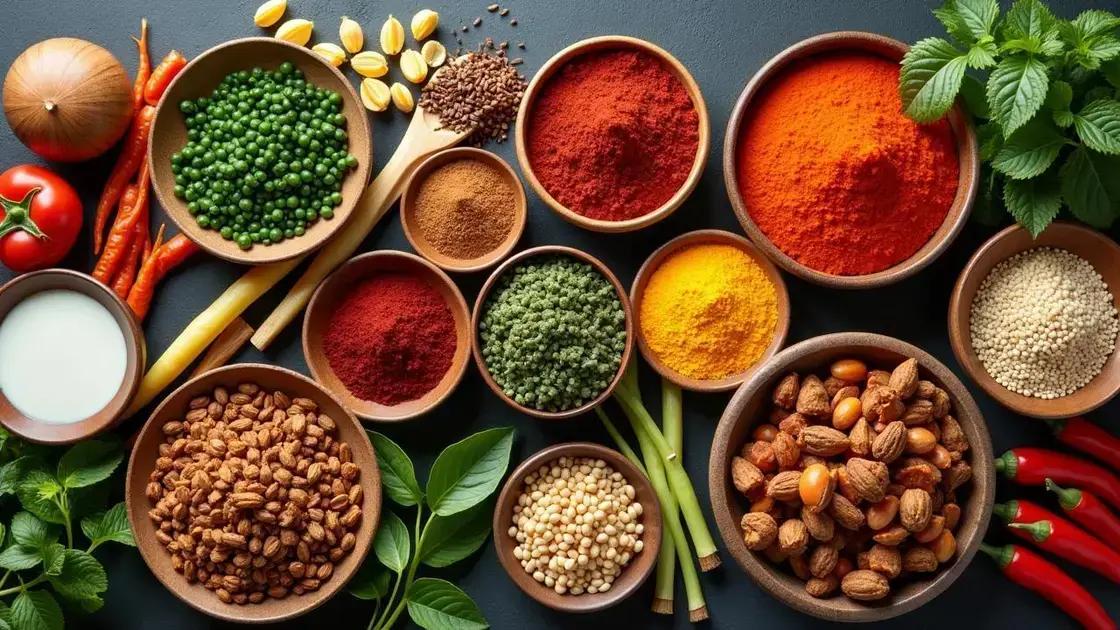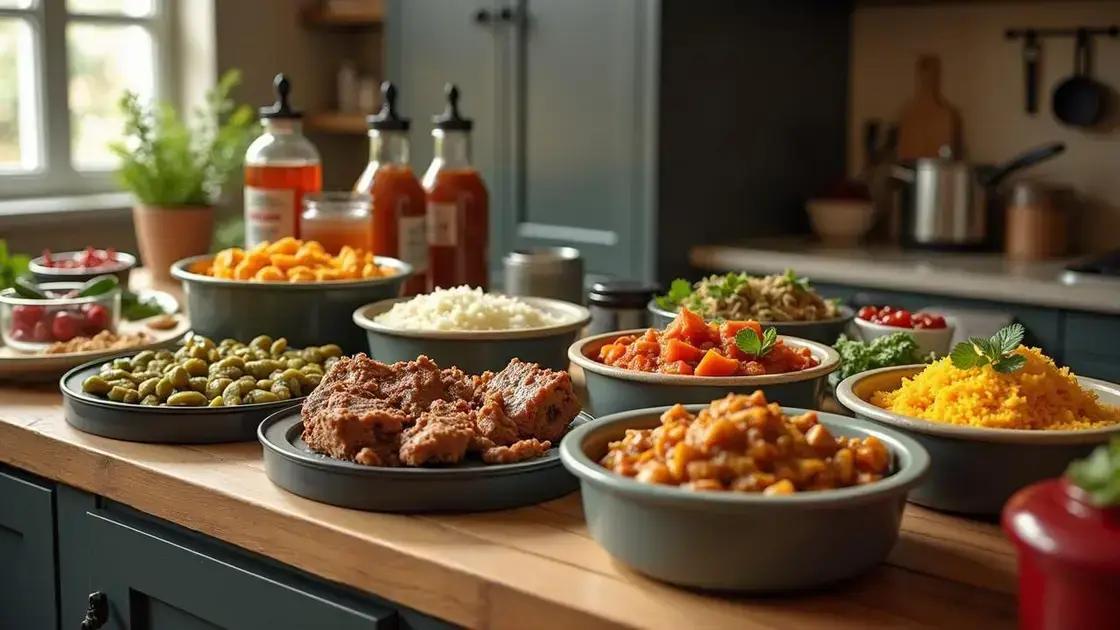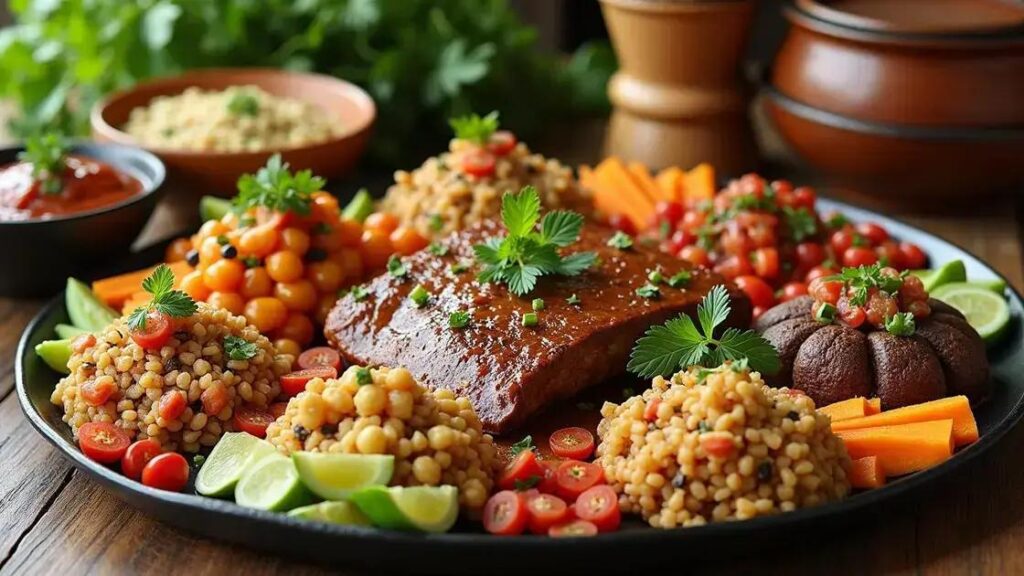African recipes can indeed be prepared daily by planning meals, batch cooking, and using flexible ingredients. With diverse flavors and cooking techniques, you can easily incorporate these vibrant dishes into your routine, making healthy and exciting meals throughout the week.
Can African recipes be prepared daily? This question sparks curiosity among food enthusiasts who appreciate the diversity of African cuisine. With its vibrant flavors and unique ingredients, many wonder if they can incorporate these dishes into their everyday meals. In this article, we will explore the adaptability of African recipes and share practical tips on how to enjoy these culinary delights daily.
Understanding African Recipes

Understanding African recipes requires a journey through the continent’s rich cultural tapestry. Each region brings its unique flavors, ingredients, and cooking techniques. African cuisine is incredibly diverse, from spicy stews to savory grilled meats. With influences from indigenous ingredients, trade, and history, these recipes tell a story of community and tradition.
A Variety of Ingredients
African recipes utilize a wide range of ingredients. Staples like rice, cassava, and maize are commonly found. Vegetables, fruits, and legumes also play a significant role. Spices are the soul of these dishes, with unique combinations reflecting local tastes and available resources.
Cooking Techniques
The methods used to prepare these recipes vary widely. Common techniques include stewing, grilling, and frying. Street food culture in many cities showcases quick, flavorful meals that can be enjoyed daily. Many African dishes are also communal, emphasizing sharing and togetherness.
Regional Specialties
From North Africa’s tagines to West Africa’s jollof rice, each region has specialties. In East Africa, you might find dishes like ugali or samosas, while Southern African recipes often include braai (barbecue). Understanding these regional differences enhances appreciation and adaptability in daily cooking.
Learning to cook African recipes can lead to exciting culinary adventures. With a little practice, these flavorful dishes can become part of your daily meal rotation, enriching your dining experience with vibrant tastes and textures.
Daily Meal Preparation Tips

Daily meal preparation using African recipes can be both fun and rewarding. To enjoy these vibrant dishes regularly, consider these simple tips:
Plan Your Meals
Start by planning your week. Choose a few African recipes to prepare and make a shopping list. This not only saves time but reduces food waste, ensuring you use everything you buy.
Batch Cooking
Batch cooking is a great strategy. Spend a day cooking larger portions of your favorite African dishes. Store these in containers, making daily meals quick and easy. Options like stews and casseroles reheat well and taste even better the next day!
Incorporate Leftovers
Don’t waste leftovers. Transform them into new meals by adding different sides or sauces. For instance, use leftover jollof rice as a base for a delicious stir-fry or salad. This not only adds variety but makes meal times exciting.
Use Freezer-Friendly Recipes
Some African recipes freeze well. Dishes like spicy beans or samosas can be prepared ahead and stored. This way, you have a quick meal ready when time is short.
Experiment with Ingredients
Feel free to adapt recipes to use what you have on hand. Different vegetables or proteins can change the flavor. The key is to stay flexible and creative, making each meal unique and delicious.
By incorporating these meal preparation tips, you can enjoy African recipes in your daily cooking routine. These dishes are not only flavorful but also a fantastic way to explore different cultures through food.
In Conclusion: Embracing African Recipes Daily
Integrating African recipes into your daily meal planning can provide a vibrant and nutritious addition to your diet. With diverse ingredients and rich flavors, these dishes are worthy of your kitchen. By understanding various cooking techniques, planning meals, and batch cooking, you can adopt a routine that allows you to enjoy these cultural delights regularly.
Adapting these recipes and incorporating leftovers not only adds variety but also makes cooking more efficient. Remember, the key to enjoying African cuisine daily lies in experimentation and creativity. So, dive into the world of African recipes and make them a staple in your home!
FAQ – Frequently Asked Questions about Preparing African Recipes Daily
Can African recipes be made quickly for daily meals?
Yes, many African recipes can be quick to prepare, especially dishes like stews and stir-fries that can be made in under 30 minutes.
How can I store leftover African dishes?
Leftover African dishes can be stored in airtight containers in the refrigerator for up to 3-4 days or frozen for longer storage.
What types of ingredients are commonly used in African recipes?
Common ingredients include rice, cassava, maize, beans, a variety of vegetables, and spices, reflecting regional diversity.
Can I modify African recipes to my liking?
Absolutely! Feel free to experiment with different vegetables, proteins, and spices to suit your taste preferences.
Are there any vegetarian African recipes?
Yes, there are plenty of vegetarian options in African cuisine, such as vegetable stews, salads, and bean dishes.
What are some quick African dishes for busy weekdays?
Dishes like jollof rice, grilled skewers, and quick vegetable stir-fries are great for busy weekdays and can be easily prepared.













